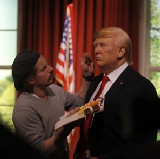President Donald Trump had a “bill signing” on Monday. After delivering some televised remarks, he sat at a small desk emblazoned with the presidential seal, signed a document, and handed out pens to assembled members of Congress. But the actual document he signed was not a bill, never passed through Congress, and had no legal effect whatsoever.
Instead, what Trump signed was a set of “principles” for his plan to hand air traffic control duties to the private sector. The document was purely symbolic; no one has even introduced new legislation to enact these principles, though the basic gist of them was derived from an older proposal.
Add Trump’s “principles” to the long and growing list of White House announcements that have zero legal import or policy ramifications. Another entry: the very same day as Trump’s pantomime bill signing, Brookings Senior fellow Bruce Riedel announced that the administration’s much-ballyhooed $110 billion weapons deal with Saudi Arabia is, in fact, “fake news.”
“There is no $110 billion deal. Instead, there are a bunch of letters of interest or intent, but not contracts,” wrote Reidel, citing “contacts in the defense business and on the Hill.”
“Many are offers that the defense industry thinks the Saudis will be interested in someday,” he added. “None of the deals identified so far are new, all began in the Obama administration.”
When Trump doesn’t yet have a fake policy to fake-announce, he sometimes pledges that one will be announced soon, and chalks that up as an achievement in of itself. (As Bloomberg noted this week, every White House proposal seems perpetually to be “two weeks” away from unveiling.) Other times, he boasts about wholly imaginary legislation, as when he said last week that his “tax bill is moving along in Congress” and “doing very well.”
There is no tax bill.
For the win
President Trump is not embellishing his agenda with fictitious achievements. The pretend bill signings and symbolic declarations are his agenda. This was clear from the very beginning of his presidential transition, when he claimed to have spared numerous jobs from outsourcing by negotiating deals with individual manufacturers. The details of his agreements with businesses like Carrier invariably turned out to be less than spectacular — but even if he had delivered everything he promised, strong-arming one factory owner at a time was never going to have a meaningful impact on the employment rate across entire sectors of the economy.
Then again, the employment rate was never the point. Trump’s announcements netted him a series of uncritical headlines and some upbeat cable news coverage. For the transition team, that counted as a policy “win.”
The problem with such victories, besides their essential hollowness, is that they’re intrinsically fleeting. Plus, like all bids for positive media attention, they depend on novelty to make a splash. It wasn’t long before Carrier-style deals were yielding diminishing returns in the PR department.
But once Trump entered the White House, he had other tools at his disposal. So he and his team hastily promulgated a series of sloppy, legally dubious executive orders that he could describe as policy victories. Those included, most famously, his misbegotten travel ban curtailing arrivals from seven Muslim-majority countries. While these orders looked like displays of untrammeled power at first, the took on a slightly different color once the judicial branch got involved.
The administration’s frantic push to repeal Obamacare — regardless of the dire consequences for millions of Americans — was similarly driven by a need for some kind of “win” that would light up Anderson Cooper’s A-block for a few precious minutes. This is not speculation; as Politico reported in April, administration officials pushed for a rushed House vote to replace the health care law specifically so Trump “could tout [it] as a major legislative victory before… his 100th day in office.”
When the bill to strip 23 million people of their health insurance did eventually get through the House (albeit after the 100-day deadline) Trump celebrated with a Rose Garden ceremony, despite not having a final version of the legislation to sign.
If victorious, Republicans will be having a big press conference at the beautiful Rose Garden of the White House immediately after vote!
— Donald J. Trump (@realDonaldTrump) May 4, 2017
But at least that was a real piece of legislation, which had passed at least one chamber of Congress. As the president’s approval rating continues to collapse and the odds lengthen that he’ll get any other major legislation through either the House or the Senate, the White House has now defaulted to touting “achievements” that are little more than jerry-rigged performance art.
Some of these non-policies can invigorate Trump’s base, or provide the temporary illusion of momentum. But few have translated into anything approaching a real legacy. And none of them have arrested the inexorable downward slide of the president’s approval rating — quite the opposite, in fact. Based on the Gallup daily tracking numbers, it looks like taking away millions of people’s health coverage and ripping up multinational agreements to mitigate climate change are unpopular even in the abstract.
The secret of any good con is knowing when to take the money and beat a hasty departure. But Trump’s con landed him a four-year term in America’s highest office; his efforts to extend that grift for the duration have not, so far, been particularly successful.

